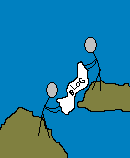An original post for Bridges:
It wasn’t so long ago that I was parenting a “normal” 4 year old. A “normal” bouncing-off-walls, vroombunctious, difficult to control, impulsive 4 year old, which probably should have tipped me off, but the parent is always the last to know, right? The truth is, we knew for a long time that something wasn’t quite… as it should be. J is clearly very intelligent. But he has such a hard time focusing, such a hard time controlling his impulses, and such a hard time controlling his temper tantrums. Clearly he wasn’t any happier about any of these things than we were. Yet, time and again, school psychologists, county therapists, teachers would tell us “no, he’s fine! He doesn’t need any services at all! Sure, he may have some issues, but clearly he doesn’t qualify!”
And so time passed without J getting the help he needed. Other mothers looked at me disapprovingly in stores. Can’t she just control her child? they must have been thinking. Well, no. No I could not “just control my child.” You see, it doesn’t work that way. As it happens, I would later find out, AD/HD isn’t caused by bad parenting (though, it also turns out, AD/HD can lead to bad parenting). You can’t “fix” AD/HD just by disciplining your child. You can’t force him to control himself through sheer act of will. It doesn’t work that way. Control my child, indeed. We were so far from control, it wasn’t funny.
Finally, at the end of May, we walked into Dr. S’s office, desperate, really, for some answers. Were we overreacting? Were we just bad parents? Was it just “normal” to have this many temper tantrums? Is it “normal” to be this impulsive? Was it just “normal” to be a moving so much it was like he was driven by a motor that never stopped? I mean, what do I know? He’s the first four year old I’ve ever parented, right? And we told the doctor everything, provided him with all of our reports, assessments, surveys, etc. He went and assessed J in the classroom, evaluated J in his office, read all of our reports and a few days before we returned to his office, we received his report in the mail with those four little letters: AD/HD (combined type).
Amazingly, though we’d jokingly called him “ADHD boy” before, it had seriously never really occurred to me before. And here it was, staring me in the face. An answer. A diagnosis. Could it be? And here, laid out in this report, was a plan of action for addressing this diagnosis. A plan for moving forward. I was on cloud nine, which might not be what you expect when receiving a diagnosis like that for your child, but it’s where I was at the time. Finally, someone was telling me I wasn’t losing my mind! And when we finally walked into the doctor’s office to discuss the report and he said to us, “A child with J’s profile would make even the best parent in the universe feel incompetent,” I was relieved, because, BOY did I feel incompetent! But this doctor was going to help us find the answers.
And slowly, we are finding answers. Medication is helping. Behavior Management is helping. The two together are magical. It’s a slow process. We don’t expect miracles overnight. But our goal is to help J be the best, most functional person he can be. AD/HD isn’t just hyperactivity as so many believe it is. It’s a true disability and it affects all aspects of a person’s life and the lives of the people around them. It turns out, parents of children with AD/HD suffer levels of stress equal to that of parents whose children suffer from Autism, Down’s Syndrome, and other disorders. Children with AD/HD are ostracized by their peers, and the parents of children with AD/HD are often left to cope on their own because their friends don’t understand, and don’t want to deal with their on-the-go child who can’t control their impulses. After all, their friends wonder, why can’t you just control your child?
It wasn’t so long ago that I was parenting a “normal” child. A “normal” child who was bouncing off walls and who couldn’t control his impulses. A “normal” child for whose faults my bad parenting was blamed. Now, just a few short weeks later, I’m parenting a child with AD/HD. A child with special needs. He’s the same child, but now, now he’ll be able to get the help he needs. Those four little letters make all the difference in the world, don’t they?
Karen is the contributing editor for ADHD. She writes daily at her personal blog, Chez Perky, where she covers not only life with her vroombunctious preschooler, but also triplets.
If this is your first time on this site, please see our comment policy.
